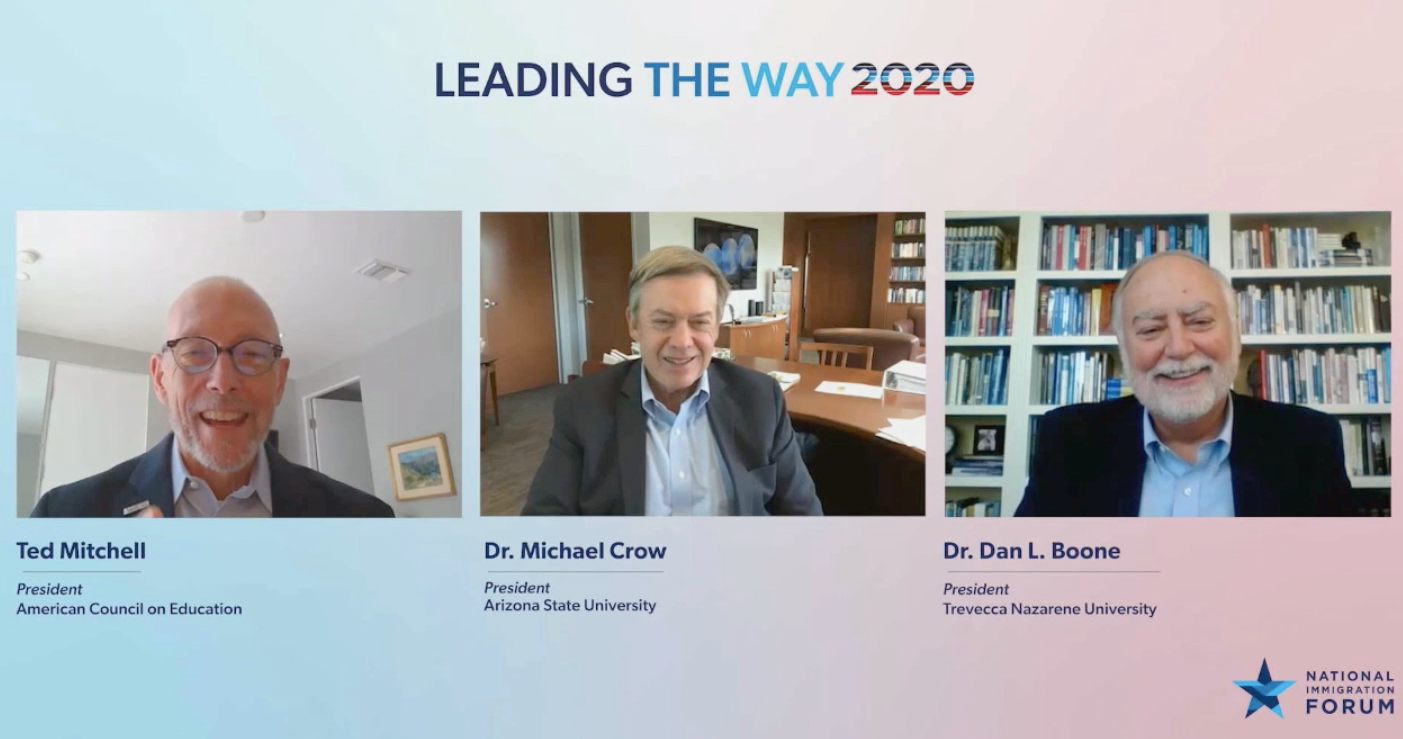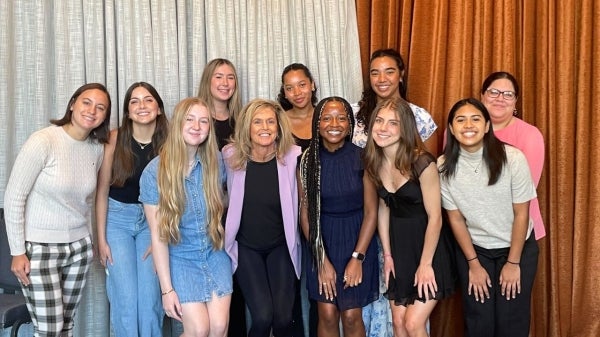ASU President Michael Crow addresses the impact of immigration on higher education

This week, Arizona State University President Michael Crow spoke about the impact of immigration on higher education institutions at the National Immigration Forum’s virtual conference “Leading the Way 2020,” a multiday conference attended by a variety of influential speakers who engaged in critical conversations about one of the most pressing challenges our country faces: immigration.
Crow sat on a panel with Dan L. Boone, president at Trevecca Nazarene University, to discuss the higher education pipeline with moderator Ted Mitchell, president of the American Council on Education.
“American colleges and universities have long been at the forefront of immigration issues,” said Mitchell. “Whether those are issues of undocumented students, DACA students and Dreamers, or whether at the other end of the academic pipeline, with graduate students who leave American colleges and universities with newly minted PhDs and aim to enter the entrepreneurship economy and need to be able to immigrate successfully in order to do that.”
ASU is at the forefront of diversity and access and is often in the news for demographic shifts in the state. Crow has experienced firsthand the unique challenges facing undocumented, DACA and Dreamer students at ASU. He related the story of a student who was in tears as he found out he was going to be deported back to Taiwan because he was an undocumented student whose parents had died.
“I’ve always viewed this as moral duty,” said Crow. “It’s a moral duty for us to find a way to advance children who find their way into this democracy to full achievement. That’s been something that we have tried to do all along.”

ASU serves DACA and Dreamer students from over 20 countries, and the Arizona Constitution guarantees the right of every child to have access to a free education through high school and an affordable university education.
“What we’ve tried to do is be the warm, welcoming democracy that’s built on immigration in particular,” said Crow. “That doesn’t mean we don’t need immigration policy, or immigration law, or immigration procedures. We do. But, in this case, relative to these students, we’re talking about people that are children. We’re talking about people that need to be treated justly. And that’s what we at ASU have decided to do.”
Mitchell asked both panelists what advice they would have for the new presidential administration to help support DACA students, Dreamers and the universities they attend. Crow encouraged the new administration to consider their actions in context with higher education’s core mission: to move students forward and build them up to succeed.
“We need to be enabled and empowered to do that,” said Crow. “We need clear definitions, we need policies that are just and equitable, and then we also need, in the bigger picture, immigration reform so that we have a system that works. There are all kinds of ways to solve these issues; we just need to make decisions — so we also need leadership.”
During the COVID-19 pandemic and the related economic downturn, which has been particularly hard on university students (particularly DACA and Dreamer students), Crow said that ASU had stepped in to provide resources to help.
Mitchell asked the panelists what higher education can do to send a message to DACA students, Dreamers, undocumented students and first-generation students that they have a place in higher education and that high education institutions are there for them.
“We’re empowering these students and their families to help shape the outcome of our socioeconomic structure,” said Crow. “I tell people that the economy is only going to work if we can find talent everywhere, empower that talent and that energy and that creativity, and move it forward. If we don’t do that, then we are going to be left with an underperforming economy, high social welfare costs, and high expenditures for low outcomes. We’re going to be left with lots of underrealized potential, we’re going to be left with social instability, and possibly with social unrest. All of those things are going to be derivative. Or we can take all of this talent and all of these kids who come from families where no one has ever been to college before and these DACA kids and help all of them to move their lives forward. That’s our choice.”
Top photo courtesy of pixabay.com
More Law, journalism and politics

CNN’s Wolf Blitzer to receive 41st Walter Cronkite Award for Excellence in Journalism
Wolf Blitzer, the longtime CNN journalist and anchor of “The Situation Room With Wolf Blitzer,” will accept the 41st Walter Cronkite Award for Excellence in Journalism, Arizona State University has…

Cronkite School launches Women Leaders in Sports Media live-learn program
Women in a new sports media program at Arizona State University got a solid game plan from a sports veteran at an Aug. 20 welcome event.“Be humble, be consistent and be a solver,” Charli Turner…

ASU center to host the Pursuits of Education and Excellence Symposium
The Center for the Study of Race and Democracy (CSRD) at Arizona State University is introducing the Pursuits of Education and Excellence Symposium as part of an ongoing initiative to commemorate the…